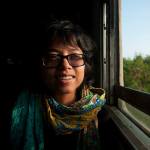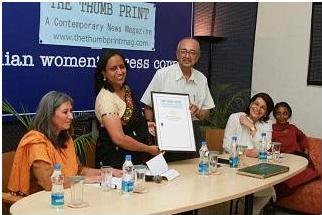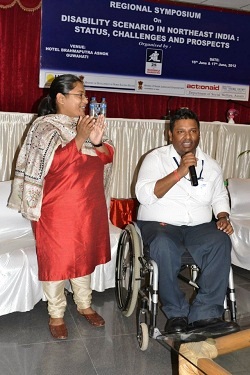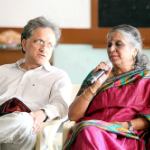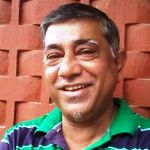The recent happenings in Kokrajhar have permeated many of our lives in many ways if my forever updating facebook wall is anything to go by. Opinions (including mine) and analysis (mostly limited) show that although we are thinking a lot, no one knows which direction we can move in. If I say it is not a Muslim-non Muslim issue, I am blasted by progressive Indians as being anti-Muslim. If I say deportation is not a feasible solution, I get chastised as being anti-North-East. When I close my eyes, I see faces of people I have seen elsewhere - stateless, homeless, nameless people. An inevitable of a globalised, climate changing world - the immigrants, sometimes called refugee, sometimes called illegal immigrants. And I think about the stateless people I met - in Mae Sot, Thailand.
Mae Sot is a small town on this side of the Moie River in Tak Province in west Thailand. On the other side of the river is Burma. The Thai-Myanmar friendship bridge connects the two countries bringing in hordes of good legally and illegally. Precious gems and teaks are part of the legal cargo where as coca-cola and medicine is illegal to trade in this border post. Ironically, there is another lot who cannot use this bridge - the people. For the people use another route that subverts the boundaries of nations - the illegal one.
Friendship bridges are a funny space I have said before. So are borders. For no borders can be so concrete that they can stop human beings from moving and interacting. The quest for a better life, the instinct for survival amongst human beings is a force like water. No matter how tight your border security is, as long as there is inequality between nations, races and classes, human beings will flow from the poorer to the richer, from have-nots to have. North America-Mexico, Zimbabwe-South Africa, Burma-Thailand, Bangladesh-India - these are only a few examples of a world wide phenomenon. So in this friendship bridge too, the rules are tight about who (only people with legal papers) and what (only goods which are legally allowed to trade) can use the bridge to cross the border officially. Unofficially however in Mae Sot there are about 300,000 Burmese people. None of them legal.
Out of these 300,000 Burmese people, about 140,000 live in the 9 refugee camps in the surrounding areas of Mae Sot town. These refugee camps are the most famous tourist attractions of Mae Sot. The camps are supposedly an example of one of the longest 'protracted refugee situation in modern history' according to Thai Burma Border Consortium. The first batch of refugees came to Mae Sot in 1984 fleeing the attack of the Junta military in the areas inhabited by ethnic groups like Karen and Shan. 28 years later, the situation has not changed much. Each year more and more people leave their homeland in the jungles of Myanmar and come to Thailand looking for safety and livelihood. It is estimated that more than 1 million people in the last 20 years have fled their homes in Burma. Some of them have entered Thailand and some remain as internally displace people (IDP) in the jungles of Burma. Burma's history of violence against its own people is a long and complex story. What I saw in Mae Sot is the story of what happens to people when they run away from their home, to become stateless subjects in another nation.
Although very magnanimously the Thai government has allowed the refugee camps to be in Mae Sot, they still do not recognize the Burmese as refugees. Nor do their laws permit any Burmese person to become a Thai citizen ever. This essentially means that the people who have been living in Thailand are illegal immigrants in Thailand and the Thai government has no legal obligation to protect and assure their human rights. In that typically Thai way of doing-and-not-doing, the Burmese people are allowed to live in Mae Sot, but are not allowed to move around. They are not suppose to move out of the camps. However, in case of an emergency they will be given a permit to travel to other parts of Thailand like Bangkok. All a bit too spiral and complicated.
In the absence of legal recognition, the immigrants do not have the right to work. If they do not work, how will they live? So, the Thai government allowed NGOs to set up operations in Mae Sot. TBBC (Thai Burma Border Consortium) is the agency which is in charge of feeding the 140,000 people that live in the camps. For 28 years, the people of the camps have been provided with food and basic services like education and health but no right to mobility or livelihood. 28 years is a long time in human life. Births, growth, love, procreation, loss, death can all occur several time in 28 years. In 28 years 3 generations of human beings can take birth and die. 28 years is a long time to stay without right to live life to its fullest. Imagine a child who was born in 1984 in the camps. Today she will be 28 without having the right to work. That would mean she will have no opportunity to develop any skills or use the creative energy of her youth. Is not that a shameful waste of human life caused by politics and policies?
But, as I said earlier, human resilience knows no bounds. And capitalists know exactly how to make use of this resilience. The Thai government which has kindly allowed the illegal people to live in their country for 28 years has declared Mae Sot a special economic zone. People who will set up business here will receive subsidies from the government. Over the years, Mae Sot has become one of the major industrial hubs of Thailand. Business wise it makes sense. Its proximity to Burma allows easy flow of raw materials for these industries and the refugee camps provide cheap labour. And when the labour is illegal no business has any responsibility to provide minimum wage or other workers rights to the people. What a sinister plan!
The evil of the capitalist policies do not end here. The kind and unkind Thai government has allowed UNHCR - the United Nations Refugee Agency to set office in Mae Sot. This essentially means, although the Thai government does not recognize the Burmese people as refugees (they have not signed the UN convention and protocol on refugees yet), they have allowed UNHCR to recognize them as refugees. Internationally, recognizing displaced people as refugees mean - they can be rehabilitated, repatriated or settled in a third country. Given that the Myanmarese government has chased them away and the Thai government has not recognised them, for the people in Mae Sot third country resettlement is the only way out. In third country resettlement there are some richer, 'developed' countries like America, Canada and Australia who have agreed to allow refugees to come in and settle in their countries.
When you first hear about it, it sounds like a plan as altruistic as it can get. But I only had to look twice - once into the 'in-processing' and once into the 'out-processing' units of the International Organisation for Migration that I saw the sharp nails of the hidden claws of capitalist designs again. IOM is an organization that works towards ensuring safe migration internationally. Once a displaced community has been given international recognition as refuges, UNHCR works toward the 3 possible settlements mentioned above. IOM helps in the 3rd party settlement. In Mae Sot for example, once people move into the camps, they have to register themselves with UNHCR. The receiving countries then agree to take in some of these refugees. The receiving countries provide free basic shelter for few months and legal documents that allow refugees to find work in their country. These documents however do not give the refugees full citizenship rights.
The refugees as they come from poor, uneducated communities and do not know the ways of the generous developed societies of the receiving countries, they have to go through some processing. This is where agencies like IOM come in. IOM 'processes' the refugees through medical checkups, cultural orientation (do not eat beetle nut, wear jeans, t-shirts and shoes instead of your lungi and always flush after you have used the toilet etc) and training on life skills like language. Once processed the refugees are sent with air tickets to the receiving country, where after a few months of living in low cost housing facilities they are now on their own to find work and start a new life. Imagine what kind of work a Karen refugee from interior Burma who has received none or minimal education and has not had the opportunity to work will find in America. The lowest paying kind of course! And that's where capitalism survives - by turning labour into a means of production.
After sending refugees into different countries for many years the UNHCR was in for a surprise in Mae Sot. For no matter how many refuges the settle in a third country, the camps always seem to be full. If there were 90,000 people in one camp at the first count, after sending 20,000 out in one year there still is 120,000 left in the last count! This befuddling math had only one explanation - more and more people were coming into the camps every day. And why not, the situation in Burma was only going from bad to worse. The Burmese army used people as human mine detectors, used them as mules and burnt their houses and fields if they refused. There are still no schools, hospitals, roads, electricity or anything else in the border states of Burma. Unable to handle these overwhelming numbers, the UNHCR has closed its registration of refugees since 2009.
Out of the 300,000 thousand that are there in Mae Sot today, 140,000 live in the camps. The rest live in Mae Sot town working in restaurants, running small business, working as cheap labour in Thai people's homes and industries. They still have no papers and have no right as a worker, will not be recognised as citizen of another country or will not be move around freely. If they are stopped by a Thai police, they will be deported. Deported yes, but only to 'return by lunch time' as one of the policeman told us.
Mae Sot makes me think a lot about the situation in our Northeast. What could be a solution to the problem in Kokrajhar? From the conflict that took place between the Bodo's and the Adivasis in 1998 and lasted a few years, the displaced people still live in camps. This year's violence has seen hundreds of thousands more to camps. Will they be able to return home ever? Violence surely is no way out. With huge inequalities, random national boundaries, dwindling resources, dirty democratic electoral politics, what will happen to millions of people who are caught between the boundaries of two nations? Is there a humane way out of this mess?
Although this story sounds grim, in Mae Sot, I also saw a side of the Burmese people in Mae Sot that gave me tremendous hope. I saw a side that human resilience was using to build societies based on human values. In fact come to think about it, with all its doing and not doing Thailand too has allowed the Burmese people to be in their land for so many years. Although they share a violent history and a hostile hangover of the wars of the past, they Thai people or the government have never been violent to the Burmese. That's surely something to learn from, nei? More about that later...
Find us on facebook: facebook.com/TheThumbPrintMag

